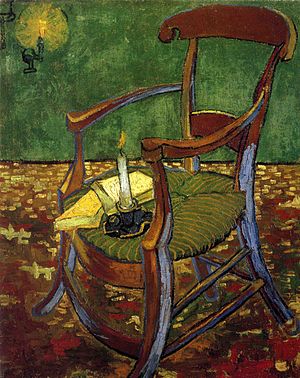 Image via WikipediaI love Van Gogh's works from the first time I saw them, but for long time I did not consider him as the "greatest" among "greatests", because I always put "traditional realistic skills" in my art criterion, even though I knew from beginning that technique was just part of art process. However, very recently I changed my mind. I finally freed myself from such conventional standard of art, and be able to look at Van Gogh from a fresh view. And from this view, I found he is simply the greatest ever.
Image via WikipediaI love Van Gogh's works from the first time I saw them, but for long time I did not consider him as the "greatest" among "greatests", because I always put "traditional realistic skills" in my art criterion, even though I knew from beginning that technique was just part of art process. However, very recently I changed my mind. I finally freed myself from such conventional standard of art, and be able to look at Van Gogh from a fresh view. And from this view, I found he is simply the greatest ever. For many people the evaluation of a painting is all about technique, or the "likeness", or the "philosophy", but all of these were not Van Gogh's concern. In Van Gogh's painting, we do not see the so-called "profound thoughts" or "concepts", we do not see the passive simulation of nature, rather, we see strong colors, impulsive brush strokes, and the imaginations created by such elements. And these elements, by my opinion, are essence of art.
Once in his life Van Gogh tried to learn realistic skill, but he could not stand the boring process of training, so very soon he quit. He was then considered by his teacher Mauve (also his cousin) as having no potential in art. However Van Gogh did not give up art. He told his brother Theo in his letters that he clearly knew what he was doing and what he wanted, and did not need that much "techniques". What he did proved what he said - within 10 years, a very short period of time, he created massive amount of works with distinguished style, which we had never seen before.
There were several Van Gogh's contemporary artists (such as Gauguin and Rousseau) also reached high achievement without strong academic art training, but in my opinions, their realistic skills were all better than Van Gogh. I believe upon that time (late 19th century), Van Gogh was the only person who made such high level of creative art with the LEAST realistic art training.
This is Van Gogh's contribution - he simply destroyed academic tradition of art. He reached the "heart of art" without all those rational "rubbish". Face to face, heart to heart, Van Gogh made love with art by his "naked" communication with the nature. Starting from him, art gradually came back to its original form: emotional expressive, playful and intuitive, other than rational, thoughtful and technical, which had dominated western art tradition for thousands years. Of course, I should not say this change happened by Van Gogh's effort alone, but he certainly made the "loudest" impact on this crucial turn in art history.

What I love about Van Gogh is his sincerity, his feeling, his love of the world and life. Paradoxical, I know, in a man with so much mental distress who eventually committed suicide. But the depth and the beauty of the man's spirit cannot be denied. He was a human being first, not just an artist, and those are the only artists who move and inspire me.
ReplyDeleteWell said NP. I used to consider him as "secondary" greatest, because I compared him with other who had masterful skills, but now I changed my mind: he surpassed all of those who needed (traditional) skills. That's what this blog is about.
ReplyDeleteI enjoy certain of van Gogh's works--but not all. He is unique; I appreciate that. He also takes the impressionistic period to the limit.
ReplyDeleteMy enjoyment of art begins after the Byzantine period and mostly ends with the impressionists. I try to understand and appreciate later art, but it is difficult. I do like Kandinsky and Bauer. That is about as modern as I go!
While I prefer those with "masterful skills", there is much to be said for the explosion of color on a canvas expressing emotion. I am slowly evolving in my appreciation.
Thanks! Interesting article.